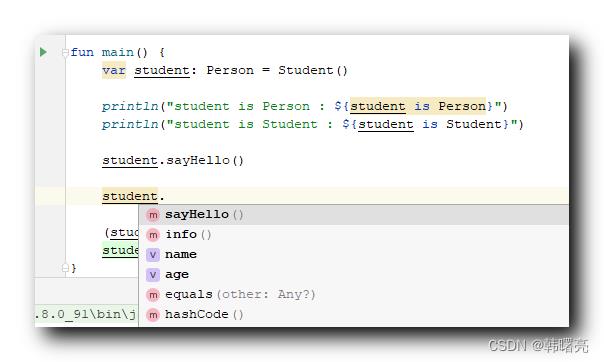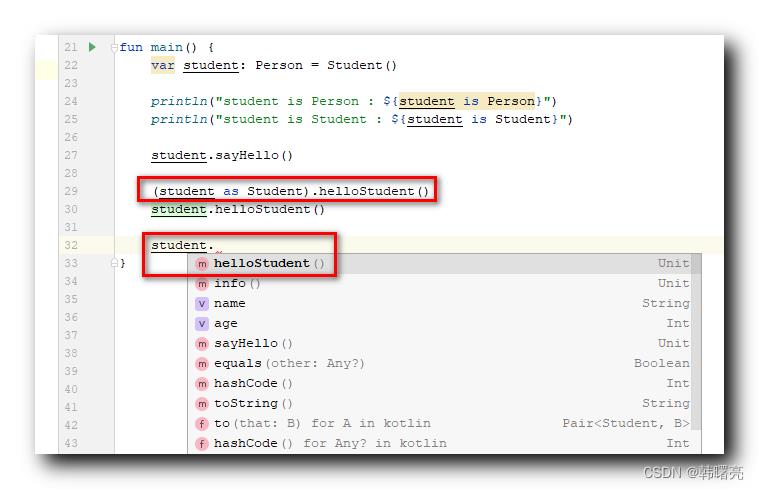Kotlin类的继承 ② ( 使用 is 运算符进行类型检测 | 使用 as 运算符进行类型转换 | 智能类型转换 | Any 超类 )
Posted 韩曙亮
tags:
篇首语:本文由小常识网(cha138.com)小编为大家整理,主要介绍了Kotlin类的继承 ② ( 使用 is 运算符进行类型检测 | 使用 as 运算符进行类型转换 | 智能类型转换 | Any 超类 )相关的知识,希望对你有一定的参考价值。
文章目录
一、使用 is 运算符进行类型检测
在 Kotlin 中 , 如果不确定一个 实例对象的类型 , 可以 使用 is 运算符进行判定 , 使用方法
实例对象 is 判定类型
上述用法可以判定 实例对象 是否是 判定类型 , 如果是 返回 true , 反之 返回 false ;
代码示例 : 在下面的代码中 , 调用 student is Person 判断 student 对象是否是 Person 类型 ;
open class Person(val name: String, val age: Int)
fun info()
println("name : $name, age : $age")
open fun sayHello()
println("Hello World")
class Student : Person("Tom", 18)
override fun sayHello()
println("Hello World Tom")
fun main()
var student = Student()
var person = Person("Jerry", 12)
println("student is Person : $student is Person")
println("student is Student : $student is Student")
println("person is Person : $person is Person")
println("person is Student : $person is Student")
执行结果 :
student is Person : true
student is Student : true
person is Person : true
person is Student : false
二、使用 as 运算符进行类型转换 ( 智能类型转换 )
将 子类对象 声明为 父类类型 , 如果要 调用 子类 特有的方法 , 必须 使用 as 运算符进行 类型转换 ;
智能类型转换 : 使用 as 运算符进行 类型转换 , 只要进行一次类型转换 , 在后面还要调用子类成员时就可以直接调用 , 不再需要手动转换类型 ;
在下面的代码中 :
父类时 Person 类型 , 子类是 Student 类型 ;
创建 Student 对象 , 但是将其声明为 Person 类型 , 此时该对象只能调用 父类 Person 的成员 , 不能调用 Student 对象的特有成员 ;
var student: Person = Student()
该 student 实例对象 , 可以调用 Person 类中的 sayHello 成员函数 , 但是不能调用 Student 类中的 helloStudent 成员函数 ; 下图中没有 helloStudent 函数的调用提示 ;

将 student 对象转为 Student 类型 , 即可调用 Student 类中的 helloStudent 成员函数 ;
(student as Student).helloStudent()
在进行第一次转换之后 , 后面 student 对象 可以直接调用 helloStudent 函数 , 不再需要进行先转换类型再调用 , 这就是 智能类型转换 ;
(student as Student).helloStudent()
student.helloStudent()

代码示例 :
open class Person(val name: String, val age: Int)
fun info()
println("name : $name, age : $age")
open fun sayHello()
println("Hello World")
class Student : Person("Tom", 18)
override fun sayHello()
println("Hello World Tom")
fun helloStudent()
println("Hello Student")
fun main()
var student: Person = Student()
println("student is Person : $student is Person")
println("student is Student : $student is Student")
student.sayHello()
(student as Student).helloStudent()
student.helloStudent()
执行结果 :
student is Person : true
student is Student : true
Hello World Tom
Hello Student
Hello Student
三、Any 超类
在 Java 中 , 所有的类都继承自 Object 类 ;
在 Kotlin 中 , 所有的类都继承自 Any 类 ;
Any 类原型如下 :
package kotlin
/**
* Kotlin类层次结构的根。每个Kotlin类都有[Any]作为超类。
*/
public open class Any
public open operator fun equals(other: Any?): Boolean
public open fun hashCode(): Int
public open fun toString(): String
Kotlin 中的 equals , hashCode , toString 等函数在编译器中都已经实现 , 在不同平台的编译器中实现不同 ;
Kotlin 的跨平台能力比 Java 更强 , 为了支持跨平台 , Kotlin 在不同的平台中有不同的实现 ;
以上是关于Kotlin类的继承 ② ( 使用 is 运算符进行类型检测 | 使用 as 运算符进行类型转换 | 智能类型转换 | Any 超类 )的主要内容,如果未能解决你的问题,请参考以下文章
Kotlin泛型 ② ( 可变参数 vararg 关键字与泛型结合使用 | 使用 [] 运算符获取指定可变参数对象 )
Kotlin——从无到有系列之中级篇:面向对象的特征与类(class)继承详解
Kotlin类的继承 ① ( 使用 open 关键字开启类的继承 | 使用 open 关键字开启方法重写 )